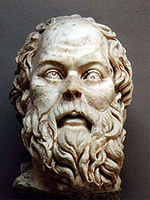Notice
“Huh?”
– Noel Coward on Notice
“The notice of which you are noticing is not a notice as the notice of which you are noticing is noticing the notices'notice of the notice that you are not.”
– Albert Einstein on Notice
If you notice This notice You will notice That this notice Was not worth noticing.
And so begins Idiocrates' Treatise on the Obvious, possibly his most famous poem. As the founder of the Idiocratic Movement, Idiocrates was a master of drawing out the tiniest detail and meaning from things he saw and events he lived through. Only 27 lines of the original 389 remain but each of them is considered a snapshot into the thinking of the great man.
Summary[edit | edit source]
Notice, although considered by some as purely a poem, on closer examination was discovered to outline Idiocrates philosophical views on the nature of living things. The piece can be broken up into three distinct sections, covering a number of key areas.
- Part One outlines first principles, that is to say those things that are the causation of events.
- Part Two outlines the events themselves, and their effect on objects close at hand.
- Part Three wanders off completely and starts waffling about ducks or something?
Each section is presented in the form of a narrative, with the third sequence performed in a high pitched voice with thumb and forefinger holding the nostrils.
Sensory Perception vs Reality[edit | edit source]
It is known that Idiocrates was a fervent supporter of the Symposium, spending many hours in manly debate with smooth young naked Greek boys, on such matters as Philosophy, Aerobics and Drinking. It is thought that during one of these thrusting debates that Idiocrates turned his great intellect towards the matter of Sensory Perception versus Reality.
"Stuff......happens", Idiocrates' most quotable quote is thought to date from this period, and this most sublime of thoughts is key to a lot of thinking within his Treatise on the Obvious. As with many masters of philosophy, Idiocrates was able to convey great meaning through the use of often simple logical statements.
Quite complex sequences would elaborate on the great questions of our time, for example:
- I am watching the boy exercise
- I am stroking the boys muscular thighs
- My nose is bleeding, and I am in great pain
Each sequence is meticulously detailed, and students would be expected to contemplate the deeper mysteries inherent within.
Examples[edit | edit source]
Here is an example of a good notice:
NOTICE!!!
If you have noticed this notice you shouldn't have noticed this notice because this notice is not worth being noticed as the notice stating that this notice shouldn't be noticed was true, therefore this notice should not have been noticed and if you had noticed this notice you had better not notice this notice anymore or you will notice the other notice which is false! Let us review: If you noticed this notice you shouldn't have noticed this notice because this notice is not worth being noticed so you had better not notice this notice anymore or you will notice the other notice which is false, leading you to the assumption that this notice is false which is a contradictory statement. Then you will be confused and not notice which notice is the real notice. Then your brain will explode and die.
Here is a bad notice (this notice is also false):
This notice is not intended for those who have noticed it. Therefore this notice shouldn't be noticed by those who have noticed it. So, by noticing this notices' notice you are actually not noticing the notice. This notice is also stating that this notice hasn't been noticed by someone who has noticed the notices' notice correctly, but by noticing this notice, you are actually not noticing the notice. By noticing this notice, you are completely wasting both your and the notices'time because the notices'notice states that by noticing this notice, you are not noticing what the notices has to make you notice. Therefore, if you noticed this particular notices'notice, you are not noticing what the notice is trying to get you to notice. If you noticed the notices' notice, you are disobeying the notice and proving your knowledge of the notice WRONG. But, if you believe this notice and do not notice the notice then you are also wrong, because if you follow this notice, you have noticed the notice and have therefore disobeyed the notice' notice. The other notice will have stated that this notice' notice is wrong but at the start it says that. You have not noticed this notice because this notice is not worth being noticed. That means that the notice' notice has been notifying you about the wrong notice, therefore that notice is not really a real notice, as this notice is the wrong notice. That also means that the notice this notice' notice is notifying us is true, because that notice notified the noticers that this notice is FALSE, but as this notice has notified the noticers, that means this notice' notice is TRUE. All the information from this notice is notifying you the TRUE information.
This notice does not make sense and in reality, is FALSE, so therefore this notice is not a good notice.

